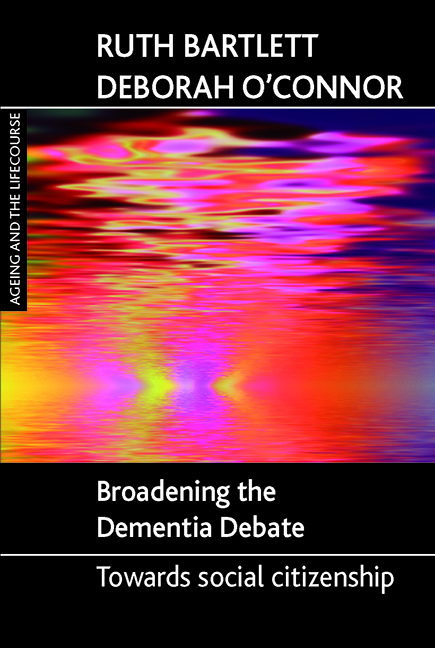Six - Extending research practices
Published online by Cambridge University Press: 01 September 2022
Summary
Introduction
There is growing emphasis on developing practices and understandings that are informed by research. Often this is discussed under the guise of ‘evidence-based’ practice, but it is also reflected in discussion about ensuring that research is designed, conducted and disseminated in such a way that it is relevant to those for whom it is intended. The focus of this chapter is on examining the implications and applications of a social citizenship lens for research practices in the area of dementia studies. It is not about how to achieve evidence-based practice, or how to do social research per se, although conventional aspects of this work, such as locating evidence, methods of data collection and analysis, are discussed. Rather, the intent is to highlight how research-related practices might be recast and extended in order to integrate a social citizenship lens. In particular, the chapter examines the ways in which some of the components of citizenship outlined in Chapter Three, namely, meaningful participation and freedom from discrimination, might be located or realised in the different phases of designing, conducting and/ or using social research.
Consistent with the overall theme of this book, this chapter argues for a broader, more ambitious vision in relation to the process of locating, designing, conducting, disseminating and using social research. We begin with the premise that we must ‘EXPECT’ that men and women with dementia can, and should, be actively involved with the generation and translation of new knowledge. However, to realise this expectation requires that we (re)consider what we regard as evidence, what we research, how we research and where we take the knowledge that is generated through research. The remainder of this chapter will address these questions of what, how, where and by whom, using the heuristic framework EXPECT, for (re)considering the essential elements of the research process in a way that brings a social citizenship lens to the fore.
EXPECT framework for locating social citizenship in research:
• Evidence-based practice reconsidered: privileging people's stories
• eXtended research agenda
• Participatory and creative methods
• Ethical debates and dilemmas
• Critical lens
• Translation of research into practice
E: Evidence-based practice reconsidered
One way in which the notion of citizenship can be located in research is to reconsider the value of evidence derived from people with dementia and their family members.
- Type
- Chapter
- Information
- Broadening the Dementia DebateTowards Social Citizenship, pp. 95 - 120Publisher: Bristol University PressPrint publication year: 2010

